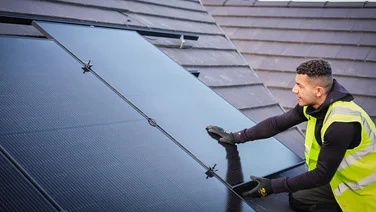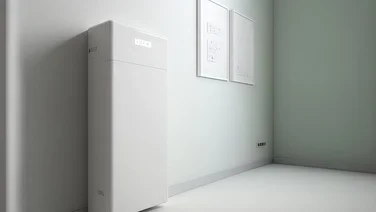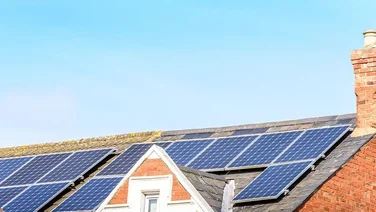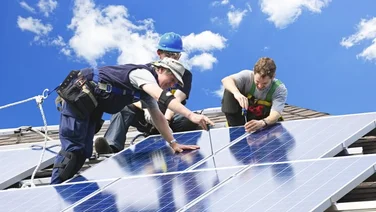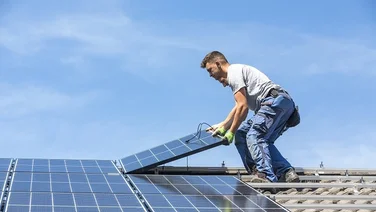We receive a small fee from trusted installers when you request a quote through our site. This helps us keep our content independent, well-researched and up to date – Learn more
✔ A solar panel system for three-bedroom house costs £7,026, on average
✔ Turbines can cost anywhere between £9,000 and £30,000
✔ To receive quotes on solar PV panels, fill out the form above
More and more people are turning to wind and solar energy to power their homes, because they can cut your bills, reduce your carbon emissions, and lessen your dependence on the grid.
But which one should you choose? Both solar and wind have their fair share of pros and cons, so if you want to learn which can save you the most money and best reduce your energy consumption, read on.
If you’re already pretty sold on solar power, you can fill out this short form to receive quotes on panels. Once you complete a few simple questions, our local suppliers will be in touch.
Where do you want to install solar panels?
Get started
What’s on this page?
Solar energy vs wind energy: Quick facts
| Solar energy facts | Wind energy facts |
|---|---|
| A domestic solar PV system could save the average household around 0.42 to 0.98 tonnes of carbon dioxide per year | A well-maintained 6kW turbine can generate around 9,000kWh a year |
| The average domestic solar PV system is 3.5kWp (10 panels), and costs around £7,026 | A residential wind turbine can save you around 3.4 tonnes of carbon dioxide a year |
| A 4kWp system in the south of England can generate around 4,200 kWh of electricity a year – the same amount it takes to turn the London Eye 56 times | A well-maintained turbine should last more than 20 years |
| Roughly 840,000 homes in the UK have solar panels | Depending on which turbine you go for, you can expect to pay between £9,900 and £30,000 |
| Solar panels usually come with a 25-year guarantee, but they should last another 10 to 15 years on top of this | More than 4,000 domestic wind turbines were registered in the UK between 2010 and 2017 |
Pros and cons of solar and wind
Solar energy pros and cons:
- Saves money on electricity bills
- Effective in residential/built-up areas
- Reduces your carbon footprint
- Adds value to your home
- You can cash in on the electricity you don’t use
- Low maintenance
- Panels can be expensive
- Doesn’t work for every type of roof
- Effectiveness depends on the season
- Panels take up a lot of space
Wind energy pros and cons:
- Reduces your carbon footprint
- Saves money on your electricity bills
- You can cash in on the electricity you don’t use
- Low maintenance
- The upfront cost is expensive
- Repair costs can put you back a few thousand
- For off-grid systems, batteries will also need replacing every 6 to 10 years
- Not as effective in built-up areas
- Larger systems can be noisy
Where do you want to install solar panels?
Get startedCosts: Is solar cheaper than wind?
Upfront costs
There’s no denying it: both of these options can strain the purse strings. However, solar is much cheaper upfront, and is typically lower maintenance. The average cost of a solar panel system for a three-bedroom house is £7,026, whereas a wind turbine can cost anywhere between £9,000 and £30,000.
Solar’s rising popularity has led to a gradual decrease in price over the past decade. In fact, according to Which?, the average price for a 4kWp solar panel system before 2015 was more than £9,000, compared to the average cost of £6,600 in 2018.
Solar panel costs also fluctuate depending on:
- How many panels you’re installing
- The type of solar panel you’re going for
- The brand you choose
The cost of wind turbines fluctuates much more than solar panels, since you have two options to choose from: pole-mounted or building-mounted turbines. Pole-mounted turbines are free-standing and must be in a high up, exposed area, whereas building-mounted turbines are much smaller and can be installed on the roof of your home.
If you want to know more about solar energy and how it can help you cut your energy bills, read our guide.
Of these two turbines, building-mounted turbines are cheaper – but as with most things, a cheaper price tag can mean a less efficient product. Since building-mounted turbines need to sit comfortably on a roof, they also need to be much more dainty – meaning they’re unable to generate as much energy as their pole-mounted acquaintance.
The energy capacity of each turbine will also add to its price. The typical cost of a 2.5kW system is between £9,900 and £19,000, whereas a 6kW system will cost you between £21,000 and £30,000.
So, if you’re after the more affordable renewable energy, stick to solar power.
Maintenance costs
Solar panels are relatively low maintenance. You need to make sure you replace the solar inverter every 10 years or so, which will leave you around £1,000 out of pocket, unless you want your whole system to go kaput.
By keeping your solar panels in pristine condition, you can increase their efficiency by up to 3-5%. Luckily for you, most solar panel systems only need basic checks and cleaning one or two times a year.
Turbines, on the other hand, require a little more tender love and care (and money). Although maintenance checks need to be carried out every couple of years, each check will cost around £100 to £200, depending on turbine size. On top of this, off-the-grid batteries will also need replacing every 6 to 10 years, with prices varying depending on the design and scale.
Although a well-maintained turbine should last more than 20 years, you may need to replace the inverter during this time, which can set you back between £1,000 and £2,000.
Looks like solar secures the victory on this one.
Are home wind turbines worth it?
In a nutshell, wind turbines are only worth installing if you live in an isolated area. If you’re considering getting a wind turbine, check the points below to see whether your home is an ideal location.
- Watch out for obstructions – Although wind power is one of the most efficient renewable energy sources, it can be quite temperamental if there are any obstructions. Any surrounding houses, trees, or hills will cause turbulence in the wind – meaning you won’t get the most out of your turbine. If you live in a city or a built-up neighbourhood, solar panels will be a better match for your home.
- Wind speed is key – To make your turbine more efficient, you need to live somewhere with a recommended wind speed of five metres per second. So if you live near the coast, don’t complain about the wind – utilise it! You can find out the average wind speed in your area using an online calculator, or install an anemometer (wind gauge) for a more precise figure.
- Do you need planning permission? – Depending on where you live, you might need planning permission to set up a wind turbine. Unfortunately, the rules and regulations are different around the UK, so prepare yourself for some in-depth research.
- How big does your turbine need to be? – Before you dip into your savings for a wind turbine, it’s worth working out which size you’ll need, and whether it’s affordable. As a rough guide, a 1.5kW turbine (in an area with an average wind speed of 14mph) would meet the needs of a home using 300kWh per month. Connection to the grid – If your home isn’t connected to the grid, wind power is an excellent way to run your home
To get the full verdict on domestic wind turbines, head over to our comprehensive guide.
How many solar panels does it take to equal the power of a wind turbine?
According to Direct Energy, if your local wind speed is 10 mph, a new wind turbine will produce an average of 2.8 kWh per day – which is about the equivalent of 8 solar panels.
Considering a 4kWp (11-12 panels) solar panel system will only set you back around £8,030, it’s safe to say that solar is the much more economical option here.
Can a small wind turbine power a house?
Surprisingly, yes! But this will come at a price.
Being able to fuel your home with wind power will depend entirely on which turbine you go for. If you opt for a building-mounted turbine, chances are you’ll only be able to power a few appliances around the home.
If you’d like your wind turbine to cover the bills, you’ll have to go for the pricier option of a pole-mounted turbine.
But using renewable energy at home doesn’t need to be this expensive. If you’re trying to go renewable on a budget, solar panels are much cheaper than wind turbines, and can generate just as much power.
Can solar and wind power the world?
Renewables should be able to power the Earth one day. In fact, researchers have predicted that the planet could be 100% renewable by 2050 – with solar and wind contributing to half of this energy. By that time, coal and gas will have been forced out by cheaper renewables.
Over the past few years, renewable energy has steadily risen in prominence – offering a promising glimpse at a fossil fuel-free future. Currently, 40% of the UK’s energy is sourced from renewables – 20% from wind, 12% from biomass, and 6% from solar.
Which is better: Solar panels or wind turbines?
Wind and solar are both excellent ways to power your home without adding to your carbon footprint – but solar is the clear winner for us.
We don’t know about you, but wind power hasn’t exactly blown us away. Whilst turbines are a good option if you can afford the upfront cost, you’ll need to take into account your location, the average wind speed, and whether or not you need planning permission before investing. Plus, not many people can set aside a chunk of money to the tune of £30,000.
Solar panels, on the other hand, are perfect for residential areas, much more affordable, and can still provide a reliable source of energy on an overcast day.
Also, 65% of people are likely to buy a house with solar panels, according to our latest National Home Energy Survey.
If you can’t wait to prop some panels on your roof and reap the rewards of solar, all you have to do is answer a few simple questions on our short form. Once you’ve completed this, our local solar panel installers will be with you shortly!


